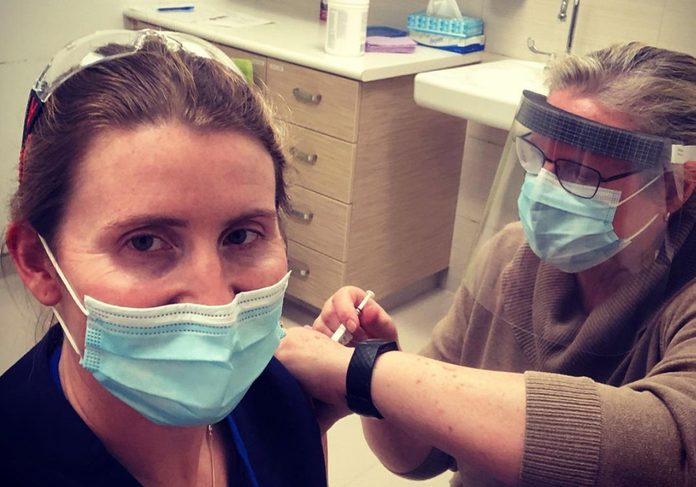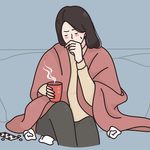Hayley Wickenheiser On What Working on the Frontlines of COVID-19 Has Been Like

'There’s a hyper alertness to everyday things. Everything is magnified.'
Canadian hockey legend Hayley Wickenheiser is just weeks away from finishing up medical school at the University of Calgary – but the last year have been unlike anything she anticipated.
Before the pandemic, the Hockey Hall of Famer and six-time Olympian split her time between working days with the Toronto Maple Leafs as their assistant director of player development and starting shifts in the emergency room in the afternoon, often working until the wee hours of the morning. When COVID-19 hit in March of last year, everything changed; her hockey obligations were moved online, and she and her classmates were pulled out of the hospital.
Wickenheiser was put back into rotations in June and has since been working on the frontlines in a variety of hospitals across Calgary, where she’s seen and experienced the pandemic’s toll on healthcare workers’ mental health. (A recent Stats Can survey found that 75 percent of healthcare workers working with COVID cases report worsening mental health, with 70 percent saying their mental health was “somewhat worse now” or “much worse now” compared to how it was prior to March 2020.)
We asked Wickenheiser about what it’s been like to be on the frontlines, and what lessons she’ll take away from this time.
(Related: COVID, One Year Later: How to Move Ahead)
Her most challenging shift
I remember one in shift in particular where we had four patients come in with COVID in varying degrees of distress. I watched a gentleman pass away with a teddy bear by his side and his family not with him because of the restrictions, which was heartbreaking. The ICU team had to rescue an airway on another COVID positive patient who needed intubation and an ICU tracker.
On that same shift, I watched my attending run a code on an overdose patient. And I held the hand of a hundred-plus-year-old gentlemen who did not have COVID but had suffered a blood clot. There was nothing doctors could do. I comforted him while we waited for his family to arrive, but he passed away.
All that happened over the span of a six- or eight-hour shift. It was very emotional. Whether you are a physician, a nurse, a porter transferring patients, or the person that has to clean up the mess after a code has been run, these are all very traumatizing, distressing things.
The challenges to mental health
The amount of donning and doffing of PPE is absolutely exhausting, and you could be doing that 50 to 100 times a day. All the protocols for hand washing, not being able to even enter the hospital through the front door… there’s a hyper alertness to everyday things. Everything is magnified. There’s concern that every patient has COVID until proven negative in the hospitals. It’s a lot of strain on people, especially those on intake in the emergency department.
I work with physicians and med students who have kids, who are either at home on Zoom or at school, and they’re trying to constantly juggle things. I work with people whose partner lost their job and they’re the sole breadwinner. I have friends that are physicians, and their whole life is falling apart outside of what they’re doing at the hospital, but they still have to keep it together to come to work and take care of their patients every day. Do I think healthcare workers are different than the average person that way? No, not really. But there is the added stress of knowing that going to your job includes an inherent risk that you might lose your life. Although, I suppose it’s in the back of all of our heads somewhere, that this thing could kill me.
I feel that there’s an incredibly high amount of burnout in healthcare workers, and I worry that when the pandemic is officially over, there will be an exodus —people in healthcare retiring or using up vacation time, because people just haven’t had a break.
I actively fight for my sanity and my health every day. You have to take time to eat. You have to take time to go to the bathroom. Sometimes it feels like it’s not possible because of what you’re doing. It’s a real departure from being an athlete, when I was so worried about my health, my fitness, all the time.
(Related: How Are Canadian Caregivers Handling COVID?)
The role of essential workers, and government
I hope there’s a better appreciation for healthcare workers, but also all of our frontline workers, police officers, firefighters, paramedics, teachers, truck drivers, everybody that’s kept this country going since this pandemic has happened. I think it’s taught us that we need to be better prepared for the next pandemic. There will be one, maybe not in my lifetime, but there will be one. How are we going to respond? It’s highlighted failures of government and how short-staffed we are in healthcare, and how people are doing crazy amounts of work with very few resources. It’s also highlighted the best of human beings, and humanity. I’ve seen amazing examples of caring and compassion, people going above and beyond. I get all emotional when I talk about it. It’s what I’ll never forget.
Receiving the COVID-19 Vaccine
I was vaccinated with the rest of the healthcare team that I was working with. I feel okay about it because I know I need to protect my patients. But I also felt horrible knowing that my parents and so many people in long-term care and critical conditions [haven’t been vaccinated yet]. I would have given it to an elderly person if I could have, but it’s just not how this thing works. It’s a little bit of a relief, but nothing’s changed for me. I still act every day like I don’t have the vaccine.
(Related: This Is What It’s Like Getting the COVID Vaccine)
What gives her hope
What never stopped surprising me is the kindness on display—from people both inside and outside of healthcare. They’re tired, they have family at home to take care of, they have other stresses in life, and yet they’re here, giving their best to save other people’s lives. That never ceases to amaze me in healthcare. It takes special people to go into this profession. It’s also been amazing to see that we could develop a vaccine in less than a year — one that can save millions of lives. What we could do with other diseases, if the same time and resources and work were applied? Science has given me hope because science is truth, and science is saving lives in this pandemic. All of those things have been awesome to witness in a pandemic, despite how difficult it’s been.
Next: A Death Doula Shares How the Pandemic is Changing People’s End-of-Life




